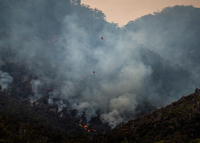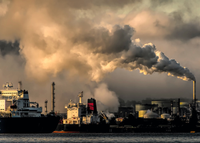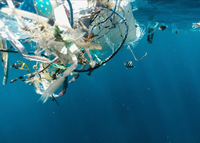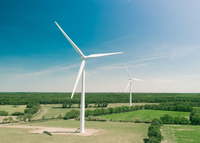As the climate crisis becomes more and more severe, it’s increasingly important to understand terms related to sustainability and the environment
A recent study shows that 42 percent of Canadians are confused by environmental terminology—which is understandable, as new words seem to be popping up all the time, and some may appear to be interchangeable.
The way we use green terminology is critical, and we need to be as precise and accurate as possible when talking about the climate. In 2019, climate activist Greta Thunberg said, “It’s 2019. Can we all now please stop saying “climate change” and instead call it what it is: climate breakdown, climate crisis, climate emergency, ecological breakdown, ecological crisis and ecological emergency?"
The first step towards saving the planet is understanding how, and this starts with the basics. We need to understand the concepts that are helping or harming the environment so we can act in favour of a more sustainable future.
Here at Environmental 911 we have compiled a comprehensive list of green terms you should know...
B Corp Certification
B Corp Certification is a designation given when a business is meeting high standards of verified performance, accountability and transparency on factors that include everything from employee benefits and charitable giving to supply-chain practices and input materials. In order to achieve certification, a company must fulfill requirements that include demonstrating high social and environmental performance. Source: B Lab
 Photo by Annie Spratt on UnsplashBiodegradable
Photo by Annie Spratt on UnsplashBiodegradable
Something that is biodegradable has the capability to break down and blend back in with the earth, given the right conditions and presence of microorganisms, fungi or bacteria. Ideally, but not always, no toxins are left behind. Source: Sustainable Business Network
Carbon footprint
One's carbon footprint is the amount of carbon dioxide (or other carbon compounds) emitted into the atmosphere by the activities of an individual, company, country, etc. Source: Dictionary.com
Carbon neutral
Companies, processes and products become carbon neutral when they calculate their carbon emissions and compensate for what they have produced via carbon offsetting projects. Source: ClimatePartner
Carbon offsetting
Any activity deemed to reduce overall emissions of greenhouse gases by purchasing verified carbon credits (also known as offsets) through emissions reduction projects or carbon trading schemes. Source: Sustainable Business Network
Circular economy
An economy where waste and pollution are designed out, products and materials are kept in use, and natural systems are regenerated. Source: Sustainable Business Network
Climate change
Climate change is identified by long-term shifts in temperatures and weather patterns. These shifts may be natural, such as through variations in the solar cycle. But since the 1800s, human activities have been the main driver of climate change, primarily due to burning fossil fuels like coal, oil and gas. Source: United Nations
 Photo by Matt Palmer on UnsplashClimate action
Photo by Matt Palmer on UnsplashClimate action
Climate action means doing activities to tackle climate change and its impacts, usually by reducing greenhouse gas emissions. Source: Sustainable Business Network
Compostable
Given the right conditions, a material that breaks down completely into non-toxic components that can support plant growth. Source: Sustainable Business Network
Eco-conscious
The mentality to focus on reducing harm to the environment wherever possible. Source: Architectural Digest
Eco-friendly
Environmentally minded actions that cause minimal harm to the earth. Source: Architectural Digest
Ecotourism
Ecotourism, also known as ecological tourism, is a subset of sustainable tourism which focuses on ecology. Ecotourism tends to be encountered in destinations where flora, fauna and cultural heritage are the primary attractions. The industry actively works towards conserving or improving the natural and cultural heritage through managing its own operations to help conserve the environment, organizing conservation projects, offering to volunteer and educating visitors. Source: The Sustainable Tourism Gateway
 Photo by Chris LeBoutillier on UnsplashFossil fuels
Photo by Chris LeBoutillier on UnsplashFossil fuels
Fossil fuels are made from decomposing plants and animals. These fuels are found in the Earth’s crust and contain carbon and hydrogen, which can be burned for energy. Coal, oil, and natural gas are examples of fossil fuels. Source: National Geographic
FSC
FSC stands for Forest Stewardship Council, which is an international non-profit organization founded in 1993 with a mission to create responsible forestry. It is the only forest verification scheme endorsed by leading environmental charities like WWF, the Woodland Trust and Greenpeace. Source: SaveMoneyCutCarbon
Global warming
Global warming is the long-term heating of Earth’s climate system observed since the pre-industrial period (between 1850 and 1900) due to human activities, primarily fossil fuel burning, which increases heat-trapping greenhouse gas levels in Earth’s atmosphere. Source: NASA
Greenhouse gas
Any gas that has the property of absorbing infrared radiation (net heat energy) emitted from Earth’s surface and radiating it back to Earth’s surface, thus contributing to the greenhouse effect. Carbon dioxide, methane and water vapour are the most important greenhouse gases. Source: Britannica
Greenwashing
Greenwashing involves activities, usually marketing, intended to make people believe a company is doing more to protect the environment than it actually is. Read more about greenwashing and how to spot it in this article. Source: Sustainable Business Network
LEED
LEED (Leadership in Energy and Environmental Design) is a third-party green building certification program and the globally recognized standard for the design, construction and operation of high-performance green buildings and neighbourhoods. The rating system approach focuses on efficiency and leadership to deliver the triple bottom line returns of "people, planet and profit.” Source: U.S. Green Building Council (USGBC)
Microplastics
Small pieces of plastic, less than 5 mm in length, found on land and water as a result of plastic pollution. Read more about microplastics and the threats they pose in our article Putting the Microscope on Microplastics. Source: Sustainable Business Network
 Photo by Naja Bertolt Jensen on UnsplashOcean Wise
Photo by Naja Bertolt Jensen on UnsplashOcean Wise
Ocean Wise is a Vancouver Aquarium conservation program, created to help businesses and their customers identify and purchase sustainable seafood. The Ocean Wise symbol next to a seafood item assures you that option is the best choice for the health of the oceans. Source: Ocean Wise
Paris Agreement
The Paris Agreement is a legally binding international treaty on climate change adopted by more than 190 countries in 2015. Its goal is to limit global warming to well below 2 degrees, preferably to 1.5 degrees Celsius, compared to pre-industrial levels. Source: Sustainable Business Network
Passive house
Passive House buildings consume up to 90 percent less heating and cooling energy than conventional buildings. Applicable to almost any building type or design, the Passive House high-performance building standard is the only internationally recognized, proven, science-based energy standard in construction. Source: Passive House Canada
Regenerative agriculture
A system of farming principles and practices that seeks to rehabilitate and enhance the entire ecosystem of the farm by placing a heavy premium on soil health with attention also paid to water management, fertilizer use and more. It is a method of farming that “improves the resources it uses, rather than destroying or depleting them,” according to the Rodale Institute. Source: The Climate Reality Project
Renewable energy
Renewable energy, often referred to as clean energy, comes from natural sources or processes that are constantly replenished. For example, sunlight and wind keep shining and blowing, even if their availability depends on time and weather. Source: NRDC (Natural Resources Defense Council)
 Photo by Thomas Reaubourg on UnsplashSustainability
Photo by Thomas Reaubourg on UnsplashSustainability
Sustainability is meeting the needs of the present without compromising the ability of future generations to meet their own needs. Today, there are almost 140 developing countries in the world seeking ways of meeting their development needs, but with the increasing threat of climate change, concrete efforts must be made to ensure development today does not negatively affect future generations. Source: United Nations
Solar energy
Solar energy is energy derived from the sun. Solar panels are used to absorb the sun’s radiation. This type of energy is captured, stored, and regenerated into the electricity grid. Source: Sustainable Review
Zero carbon
Zero carbon is a term sometimes used to describe a product or service that creates no CO2 or greenhouse gas emissions during production and/or operation. Source: Sustainable Business Network
Zero waste
Zero waste is a target of sending no waste for disposal via landfill or burning. Source: Sustainable Business Network





